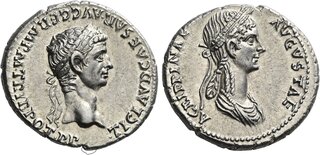| Numismatica Ars Classica > Auction 143 | Auction date: 7 May 2024 |
| Lot number: 496 Price realized: This lot is for sale in an upcoming auction - Bid on this lot  | Show similar lots on CoinArchives Find similar lots in upcoming auctions on |
| Lot description: The Dioscuri Collection. The Roman Empire. Claudius, 41 – 54. Denarius 50-54, AR 19 mm, 3.65 g. TI CLAVD CAESAR AVG GERM P M TRIB POT P P Laureate head of Claudius r. Rev. AGRIPPINAE – AVGVSTAE Draped bust of Agrippina Minor r., wearing barley wreath. C 4. BMC 75. RIC 81. CBN 82. Very rare and in exceptional condition for the issue, possibly the finest specimen known. Two magnificent portrait perfectly struck in high relief. Virtually as struck and Fdc Ex NAC sale 106, 2018, 575. This double portrait denarius, struck in the four years before the death of Claudius illustrates the importance of his fourth wife, Agrippina the Younger. Suetonius and other sources claim that the emperor had a weakness for his wives, and indeed, following the public scandal and shame brought upon him by his third wife Messalina in 48, he was quick to find a fourth. In 49, he married his niece Agrippina the Younger for strongly political reasons. As she was the great-granddaughter of Augustus and a daughter of Claudius' brother, the celebrated general Germanicus, it was hoped by both the emperor and the Senate that the marriage would end the feud between Julian and Claudian branches of the imperial dynasty that had been going on since the death of Germanicus in 19. However, the marriage was very problematic. Not only was it disapproved by much of Roman society-the family relationship between Claudius and Agrippina made it immoral in Roman custom-Claudius had Britannicus, a son from his marriage to Messalina whom he saw as his successor while Agrippina had Nero, a son from her previous marriage to Cn. Domitius Ahenobarbus, whom she wished to become Claudius' heir. Almost as soon as Agrippina became empress, she began working on the advancement of her son. She first eliminated any individuals in the imperial court who seemed loyal to the memory of Messalina and then set about gaining influence with Claudius' chief secretary, doctor, and with the praetorian prefect. Thus, she was able to control the imperial palace and increasingly her husband. Her power only increased in 50, when Claudius granted her the honour of the title Augusta. While this title became commonplace for empresses later in imperial history, at the time this was a very special honour-only Livia, the wife of Augustus, had previously received this title. It had also been granted to Antonia the Younger by her grandson Caligula, but she refused to accept. The present coin, which employs the title of Augusta on the reverse, is very likely to have been struck and possibly distributed as largesse on the occasion of Agrippina's assumption of the title. At the same time that Agrippina became Augusta, a position that gave her even greater influence over Claudius and expanded her powers in the imperial administration, Nero was also adopted by Claudius as a second son alongside Britannicus. In the following year, Agrippina worked to isolate Britannicus from his father and convinced Claudius to recognise Nero as his heir. To this end, she arranged a marriage between her son and Claudia Octavia, the daughter of Claudius and Messalina in 53. All seemed to be going according to her plans when suddenly, in 54, Claudius had a change of heart and began preparing Britannicus to be his successor. Due to this unexpected development, Agrippina was widely suspected as a murderess when Claudius died on 13 October 54. Suetonius claims that the murder weapon was a poisoned plate of mushrooms. Regardless of what involvement she may or may not have had in the death of her husband, Claudius' will granting joint rule to Nero and Britannicus or sole rule to Britannicus was repressed and Nero succeeded him as emperor. The 13-year-old Britannicus was poisoned a year later to prevent him from posing a threat to Nero's reign. Agrippina had achieved her goal and her son was emperor. Unfortunately, her overbearing character and her desire to use the young Nero as a tool for her own ambitions finally led to her murder in 59. Estimate: 15000 CHF |  |



